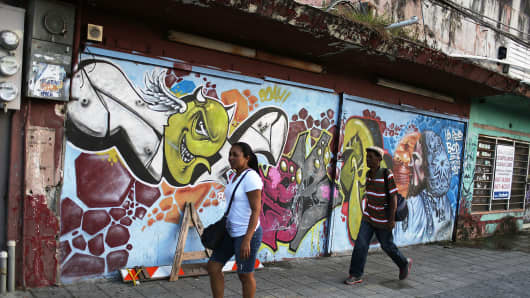Ever since Puerto Rican Governor Alejandro García Padilla said late last month that the island's approximately $72 billion in debt was "not payable," institutional investors have scrambled to re-assess their risk exposure, particularly in the event the federal government stepped in to provide assistance.
But although the Puerto Rican debt crisis has garnered increasing attention in Washington in recent weeks, Congress is unlikely to get involved, barring a crisis of Jurassic World proportions.
Puerto Rican officials, along with holders of the general obligation bonds that are high up in the island's capital structure, have lobbied Congress for months to extend Chapter 9 authority under the bankruptcy code, which is for reorganizing municipalities. Currently, Puerto Rican municipalities and public corporations cannot avail themselves of Chapter 9 bankruptcy protection. As Puerto Rico is now pursuing a voluntary debt restructuring, it especially wants access to Chapter 9 to address any potential holdouts. But these lobbying efforts have been ineffective thus far and are unlikely to prove any more successful going forward.
Read MoreIs your bond fund invested in Puerto Rico?
Rightly or wrongly, several Republicans in the GOP-controlled Congress view extending Chapter 9 in this instance as tantamount to a "bailout," a concept that does not sit well in Washington these days, particularly among conservatives. Holders of debt in Puerto Rican public agencies, most prominently the Puerto Rico Electric Power Authority (PREPA), have vehemently argued that giving PREPA and other such island organizations Chapter 9 protection would not only be changing the rules in the middle of the game, but would also condone past fiscal profligacy, exacerbating moral hazard.
Moreover, members of Congress and presidential candidates seizing on the issue for political gain threaten to give Puerto Rico's Chapter 9 a partisan tinge, making it more difficult to attract sufficient bipartisan support. Puerto Rico's non-voting representative in Congress, Resident Commissioner Pedro R. Pierluisi, has refrained from adding any Democratic co-sponsors on his House version of a Chapter 9 bill until he is able to secure at least one Republican co-sponsor. But Senators Chuck Schumer (D-NY) and Richard Blumenthal (D-CT), who hail from states with substantial Puerto Rican communities, introduced a Senate version of the measure recently with 10 co-sponsors, none of whom are Republican.
Chapter 9 proponents highlight that prominent 2016 GOP presidential candidate Jeb Bush has already thrown his support behind their initiative. However, no GOP candidates who are currently in office have joined the cause. Most notably, the other presidential candidate from Florida, Senator Marco Rubio, has not yet taken a position. Rubio is caught between pressure from the Sunshine State's sizable Puerto Rican share of the electorate and an important campaign funding source, the Koch brothers' network, which opposes Chapter 9, but supports the imposition of an external control board.
Read MoreThe ripple effect of Puerto Rico's debt crisis: Lebenthal
Puerto Rico announced earlier this month that it would form an internal control board to help put its fiscal house in order in accordance with the so-called "Krueger report" it commissioned to take stock of its financial situation. Investors are unimpressed though. The external control board proposal is getting consideration at least among some conservative lawmakers and interest groups in Washington, but Congress will be loath to step into Puerto Rico's economic quagmire with such a heavy hand. Besides the colonial overtones that doing so would produce, neither Chapter 9 nor a control board bring new resources to bear to address Puerto Rico's fiscal woes. These measures would simply help sort out the winners and losers – or differentiate the bigger losers from smaller losers, as the case may be – of Puerto Rico's past borrowing excesses.
None of this is to say that Puerto Rico's debt problem will not get quite messy in the months ahead. By its next major payments due in September and January, the island very well could stop paying at least some of its debts -- if not declare a full moratorium. In fact, it already has declared that it has insufficient cash flow to cover a Public Finance Corp. debt-service payment due on August 1.
The one thing that most Wall Street investors in Puerto Rico's debt and Puerto Rican officials agree upon is that, in the case of a default, litigation will inevitably ensue as the packs of bondholders across the array of tranches and issuers within the island's capital structure will rush to file suits in multiple legal venues without any clear judicial framework on how to prioritize their claims. Although this may appear to be a Jurassic World-level crisis for investors, it will not be one for Washington. As long as the island's power stays on, its water continues to run, and its police remain on the streets, Congress will shrug off the failure of the island's instrumentalities to continue to honor their debts.
When the U.S. Court of Appeals for the First Circuit affirmed on July 6 a district court's prior invalidation of a Puerto Rican local law seeking to give itself Chapter 9 protection, the majority opinion stated, "In denying Puerto Rico the power to choose federal Chapter 9 relief, Congress has retained for itself the authority to decide which solution best navigates the gauntlet in Puerto Rico's case."
Read MoreTrump golf club in Puerto Rico files for bankruptcy
But a stampede of investors will not be a sufficient catalyst to force Congress to act. Short of breaking news on television that depicts strife on the island on scale with San Juan being overrun by a pack of dinosaurs, Congress will leave it to the courts to sort out the carnage.
Commentary by Stephen A. Myrow, managing partner of Beacon Policy Advisors LLC, an independent policy research firm based in Washington, DC. He has served in various government roles, including as a senior Treasury Department official in 2008-2009. Follow him on Twitter @smyrow.


